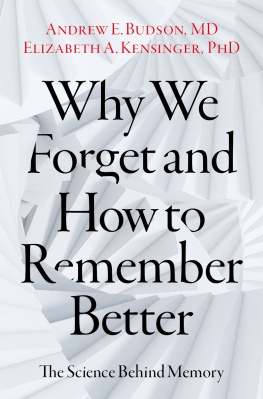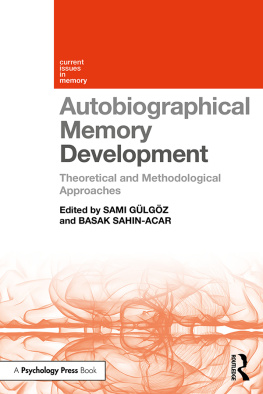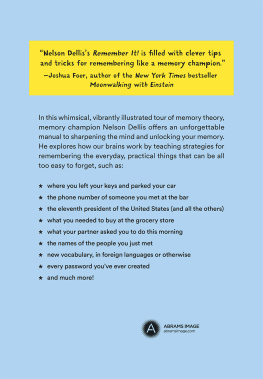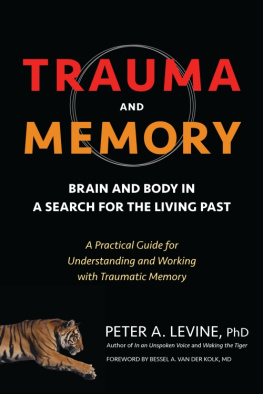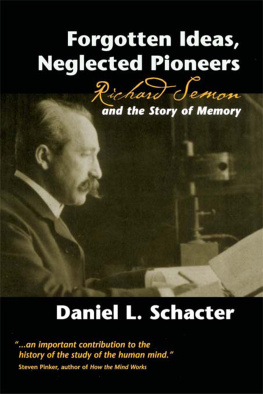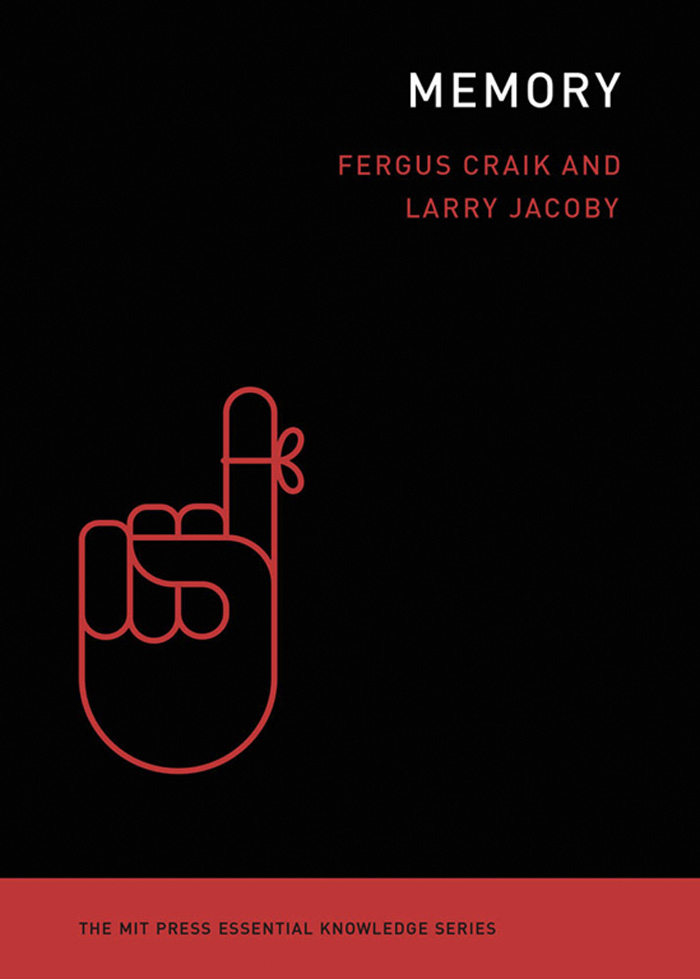
Memory

The MIT Press Essential Knowledge Series
A complete list of books in this series can be found online at https://mitpress.mit.edu/books/series/mit-press-essential-knowledge-series.
Memory
Fergus Craik and Larry Jacoby
The MIT Press | Cambridge, Massachusetts | London, England
2023 Massachusetts Institute of Technology
All rights reserved. No part of this book may be reproduced in any form by any electronic or mechanical means (including photocopying, recording, or information storage and retrieval) without permission in writing from the publisher.
The MIT Press would like to thank the anonymous peer reviewers who provided comments on drafts of this book. The generous work of academic experts is essential for establishing the authority and quality of our publications. We acknowledge with gratitude the contributions of these otherwise uncredited readers.
This book was set in Chaparral Pro by New Best-set Typesetters Ltd.
Library of Congress Cataloging-in-Publication Data
Names: Craik, Fergus I. M., author. | Jacoby, Larry, author.
Title: Memory / Fergus Craik and Larry Jacoby.
Description: Cambridge, Massachusetts : The MIT Press, [2023] | Series: The MIT Press essential knowledge series | Includes bibliographical references and index.
Identifiers: LCCN 2022011631 (print) | LCCN 2022011632 (ebook) | ISBN 9780262545204 (paperback) | ISBN 9780262373579 (epub) | ISBN 9780262373586 (pdf)
Subjects: LCSH: Memory.
Classification: LCC BF371 .C7523 2023 (print) | LCC BF371 (ebook) | DDC 153.1/2dc23/eng/20220720
LC record available at https://lccn.loc.gov/2022011631
LC ebook record available at https://lccn.loc.gov/2022011632
10 9 8 7 6 5 4 3 2 1
d_r0
Contents
Series Foreword
The MIT Press Essential Knowledge series offers accessible, concise, beautifully produced pocket-size books on topics of current interest. Written by leading thinkers, the books in this series deliver expert overviews of subjects that range from the cultural and the historical to the scientific and the technical.
In todays era of instant information gratification, we have ready access to opinions, rationalizations, and superficial descriptions. Much harder to come by is the foundational knowledge that informs a principled understanding of the world. Essential Knowledge books fill that need. Synthesizing specialized subject matter for nonspecialists and engaging critical topics through fundamentals, each of these compact volumes offers readers a point of access to complex ideas.
Preface
Just about everyone is interested in memory. Initially this interest stems from the experience of memorys astonishing strengths and weaknesses. How can it be that the smell of baking bread transports us back sixty years to grandmas kitchen, while a minute later we cant recall the name of a well-known colleague (which in turn pops back to mind spontaneously two hours later)? We can remember details of some emotional childhood event with great clarity, yet forget where we left the car keys twenty minutes ago. We remember hearing the news of some shockingly unexpected eventthe death of Princess Diana or the destruction of the World Trade Center towers on 9/11not only hearing the news, but where we were, who was there, and what happened next. Yet studies have shown that such crystal clear memories are often false. How can that be when we are certain that some detail was part of the experience? What about extraordinary feats of memoryfor example, the ability of chess masters to hold eight or ten games in mind simultaneously as play progresses, or a musical maestro to conduct a long, complex symphony without the aid of the score? What happens in the brain when older people become pathologically forgetful in the early stages of Alzheimers disease? And if you start forgetting names and intended grocery purchases when you are sixty-three, is that simply normal aging or is it a sign of encroaching dementia? Finally, how effective are brain games and dietary supplements at improving memory, attention, and concentration?
This book attempts to answer at least some of these intriguing questions. We describe cases of extraordinary memory and the efforts made by researchers to understand them as well as cases of memory failure due to brain damage, disease, emotional trauma, and other causes. Everyday strengths and weaknesses have been investigated by cognitive psychologists in laboratory studies for more than a hundred years, and we look at some of their methods, findings, and implications for real-life remembering. Patients with memory problems have provided another major source of knowledge about how memory is represented and organized. We discuss a few famous cases, and what they reveal about the registration, retention, and retrieval of specific events and general knowledge in the brain. The biological basis of memory and learning is a further topic of great interest to researchers. In fact, much of the excitement in current memory research stems from interactions among geneticists, molecular biologists, neurophysiologists, and behavioral psychologists, often working with animals to gain clues to the nature of memory and its evolutionary history. The introduction of neuroimaging methodsbrain scanningis an important development in this research area. The techniques allow researchers to study the brain changes accompanying the cognitive processes of encoding (the registration of new information) and retrieval.
Memory can therefore be portrayed in several different ways. Our own experiences of memorythe rich recollection of a family holiday or the frustration of failing to recall a name we know wellare probably most important to us, but when scientists study memory, other aspects come into play. Cognitive psychologists document the conditions that affect retention and forgetting; neuroscientists explore the underpinnings of memory in terms of brain networks; and molecular biologists study how such networks are formed and activated during learning and remembering. These different areas of research are all crucial. A final understanding of what human memory is will require a demonstration of how findings from these various levels of analysis map onto each other, how changes in single neurons combine to form changes in extensive brain networks, and how differences in network organization translate to differences in behavior and to differences in our personal experience.
1
Understanding Memory
An Evolving Story
Some Early Metaphors
In this first chapter, we review the various ways in which philosophers and scientists over the centuries have attempted to understand what memory is, and how it works. Initially, the descriptions were frankly metaphors, but they typically make important points about the nature of learning and memory. One obvious feature of such metaphors is that they reflect the communication technology of the day, and this is true even of early metaphors. Both Plato and Aristotle likened memory to the wax tablets used by their students to record their lessons. A signet ring pressed into the soft wax left an impressiona term still in use todayand the record remained until it was overwritten by a further mark or the wax melted. These ancient philosophers also suggested that differences in memory ability could be understood in terms of differences in the consistency of the material receiving impressions. If the wax was too soft and runny, it would not retain a sharp image, and if it was too hard (as perhaps in elderly people), it would not record the impression. Ingenious though they were, however, these early thinkers were unable to show what corresponded to the wax tablet in real humans.
Next page

